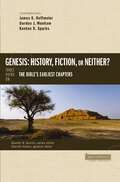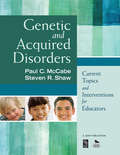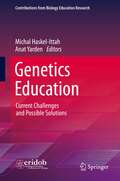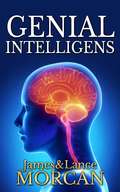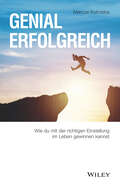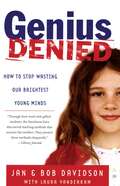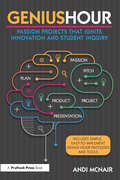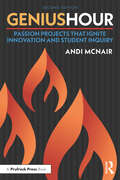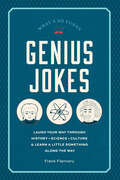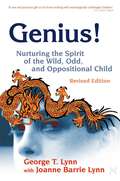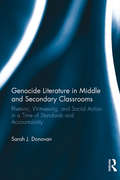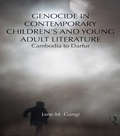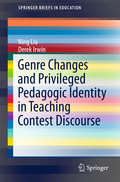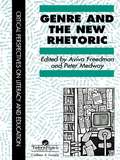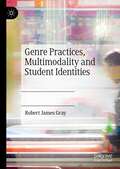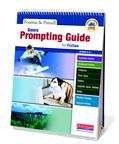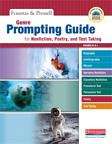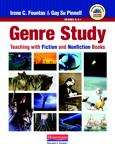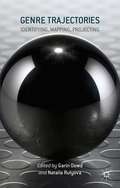- Table View
- List View
Genesis: Three Views on the Bible’s Earliest Chapters (Counterpoints: Bible and Theology)
by Stanley N. Gundry Charles Halton Gordon John Wenham James K. Hoffmeier Kenton SparksThere is little doubt that in recent years the nature of the Genesis narrative has sparked much debate among Christians. This Counterpoints volume introduces three predominant interpretive genres and their implications for biblical understanding. Each contributor identifies their position on the genre of Genesis 1-11, addressing why it is appropriate to the text, and contributes examples of its application to a variety of passages. The contributors and views include: James K. Hoffmeier: Theological History Gordon J. Wenham: Proto-History Kenton K. Sparks: Ancient Historiography General editor and Old Testament scholar Charles Halton explains the importance of genre and provides historical insight in the introduction and helpful summaries of each position in the conclusion. In the reader-friendly Counterpoints format, this book helps readers to reflect on the strengths and weaknesses of each view and draw informed conclusions in this much-debated topic.
Genesis–Leviticus (The Expositor's Bible Commentary)
by ZondervanContinuing a Gold Medallion Award-winning legacy, the completely revised Expositor's Bible Commentary puts world-class biblical scholarship in your hands.A staple for students, teachers, and pastors worldwide, The Expositor's Bible Commentary (EBC) offers comprehensive yet succinct commentary from scholars committed to the authority of the Holy Scriptures. The EBC uses the New International Version of the Bible, but the contributors work from the original Hebrew and Greek languages and refer to other translations when useful.Each section of the commentary includes:An introduction: background information, a short bibliography, and an outlineAn overview of Scripture to illuminate the big pictureThe complete NIV textExtensive commentaryNotes on textual questions, key words, and conceptsReflections to give expanded thoughts on important issuesThe series features 56 contributors, who:Believe in the divine inspiration, complete trustworthiness, and full authority of the BibleHave demonstrated proficiency in the biblical book that is their specialtyAre committed to the church and the pastoral dimension of biblical interpretationRepresent geographical and denominational diversityUse a balanced and respectful approach toward marked differences of opinionWrite from an evangelical viewpointFor insightful exposition, thoughtful discussion, and ease of use—look no further than The Expositor's Bible Commentary.
Genetic and Acquired Disorders: Current Topics and Interventions for Educators
by Steven R. Shaw Dr Paul C. MccabeWritten for school psychologists, counselors, administrators, and teachers, this volume outlines issues affecting children who are born with or acquire a medical disorder or disease.
Genetically Modified Organisms, Grade 7: STEM Road Map for Middle School (STEM Road Map Curriculum Series)
by Carla C. Johnson Erin E. Peters-Burton Janet B. WaltonWhat if you could challenge your seventh graders to become informed citizens by analyzing real-world implications of GMOs? With this volume in the STEM Road Map Curriculum Series, you can! Genetically Modified Organisms outlines a journey that will steer your students toward authentic problem solving while grounding them in integrated STEM disciplines. Like the other volumes in the series, this book is designed to meet the growing need to infuse real-world learning into K–12 classrooms. This interdisciplinary, five-lesson module uses project- and problem-based learning to help students investigate the opportunities and challenges of GMO production and consumption. Working in teams, students will create a documentary communicating the health, social, and economic aspects of GMO production and consumption. To support this goal, students will do the following: • Use the Internet and other sources to build knowledge of an issue, and recognize and value stakeholders and their viewpoints in an issue. • Explore the relationship among local, state, and federal legislation related to GMOs. • Understand the role of cost-benefit analysis in making informed economic decisions. • Develop skills to evaluate arguments, create and communicate individual understanding and perspectives. • Gain a deeper understanding that structure and function are related by examining plants and how the environment and genetics influences structure. • Gain a better understanding of what tools humans have developed to genetically alter organisms for human benefit. The STEM Road Map Curriculum Series is anchored in the Next Generation Science Standards, the Common Core State Standards, and the Framework for 21st Century Learning. In-depth and flexible, Genetically Modified Organisms can be used as a whole unit or in part to meet the needs of districts, schools, and teachers who are charting a course toward an integrated STEM approach.
Genetics Education: Current Challenges and Possible Solutions (Contributions from Biology Education Research)
by Anat Yarden Michal Haskel-IttahThis edited volume presents the current state of the art of genetics education and the challenges it holds for teaching as well as for learning. It addresses topics such as how genetics should be taught in order to provide students with a wide and connected view of the field. It gives in-depth aspects that should be considered for teaching genetics and the effect on the student’s understanding. This book provides novel ideas for biology teachers, curriculum developers and researchers on how to confront the presented challenges in a way that may enable them to advance genetics education in the 21st century. It reviews the complexity of teaching and learning genetics, largely overlooked by biology textbooks and classroom instruction. It composes a crucial component of scientific literacy.
Genial Intelligens
by James Morcan Lance Morcan Elisabet NorrisGenial Intelligens er den ultimate avhandling om påskyndet lære metoder. Skrevet av romanforfattere, filmskapere og uavhengige undersøkere James Morcan & Lance Morcan med forord av ledende vitenskapsmann Dr. Takaaki Musha, knuser de med denne boka myten om at genier er født og ikke utviklet. Den avslører hvordan i fleste tilfeller at over-den-normale intelligens er oppnådd gjennom overlegne kognitive teknikker eller hjerneforbedrende teknologier. Berømte genier som blir studert inkluderer Apple grunnlegger Steve Jobs som en 19-åring begynte å øve fortidsdisiplin som aktiverer deler av hjernen som lå i dvale; Albert Einstein som fant opp den store relavitetsteori mens han brukte sjeldne metoder for å få tilgang til underbevisstheten; Kim Peek (den virkelige 'Rain Man') som kunne hurtiglese hvilken bok som helst på fem minutter med fullstendig forståelse for innholdet; Indiske matematiske storhjernen Srinivasa Ramanujan som, selvom utrent, kom opp med ekstraordinære formler som gjorde akademikere fullstendig sjokkskadde; Wolfgang Amadeus Mozart som komponerte hele stykker mens han var i en endret forstand. Iblant oppfinnelsen som blir delt med leserne er hjernebølger som er vanlig for genier og de forskjellige måter å kalle fram disse forskjellige hjernbølgene; mental teknikker som verdens elite og A-liste kjendiser bruker i all stillhet for å hjelpe de å behandle informasjon mens de sover eller i virtuelle verdener; kjemiske substanser som studenter og akademikere rundt om i verden bruker for å kick-starte hjernen i høy gir; banebrytende teknologier som forretnings tycooner og professionelle idrettsfolk bruker for å oppnå cerebral fordel over konkurrentene. I de nyeste funn innenfor nevrovitenskapen, lister Genial Intelligens dusinvis av praktiske metoder for å øke IQen og hurtiglese alle felt.
Genial erfolgreich: Wie du mit der richtigen Einstellung im Leben gewinnen kannst
by Marcus KutrzebaWieso schaffen nur 10% der gegründeten Unternehmen weltweit das wirtschaftliche Überleben? Weshalb fühlen sich immer mehr Unter-Dreißigjährige schon ausgelaugt? Warum liegt die Scheidungsrate international bei knapp 50%? Die Antworten darauf liefert dieses Buch, das den gedanklichen Befreiungsschlag unternimmt, der viele Probleme lösen kann in Beziehungen, Firmen und Organisationen jeglicher Art. Der Weg führt über die innere Einstellung. Lebensglück und Erfolg sind damit untrennbar verbunden. Ergänzt und untermauert wird der Mindset-Ansatz des Autors durch praktische, unterhaltsame und alarmierende Anekdoten aus seiner langjährigen Seminar- und Unterrichtspraxis in Firmen und Hochschulen - dort, wo die Menschen stark fremdbestimmt und ihr Denken sowie ihre Haltung entsprechend beeinflusst sind.
Geninne's Art: Birds In Watercolor, Collage, and Ink
by Geninne ZlatkisA personal field guide to how the popular Santa Fe artist finds her inspiration and creates her charming paintings and collages of birds and nature.Brimming with inspiring examples of the artist’s work, this beautiful book takes you inside Geninne’s studio for an in-depth look at how she creates. You will discover, step by step, how this devoted artist spends time photographing nature, selecting her materials, and developing her personal imagery. Explore:How her studio is set up, how she works, and what materials and tools she usesHow she captures nature with both a camera and phone for referenceHer artistic process through the step-by-step creation of 5 watercolor paintings, 5 collages, and 5 ink drawings, with notes on each medium and techniqueAs a special bonus, the book includes 32 pages of collage papers, painted and selected by Geninne, for you to use as you explore and develop your own artistic voice.Vibrant, detailed, and richly imaginative, Geninne’s interpretation of the birds she has observed so closely will inspire you to use the natural world as fodder for your paintings, drawings, and collages.“Lovely . . . If you’re a playful artist avid about collage or ink drawing, you might be smitten.” —Arts & Activities
Genitore per la Prima Volta: Come Crescere Bambini Sani e Felici Attraverso Amore, Cure ed Educazione
by Hiddenstuff EntertainmentSe avete appena avuto il vostro primogenito o state aspettando un bambino, avete trovato la guida giusta! I neonati sono estremamente fragili e hanno bisogno di molte cure: prendervi cura di un neonato sarà una delle più grandi sfide della vostra vita! Assicuratevi di essere preparati! - Come Prendervi Cura del Vostro Neonato - Cosa Comprare - Nutrizione - Come Crescere il Vostro Bambino E molte altre informazioni utili per i neogenitori! --> Vai in cima a questa pagina e clicca "aggiungi al carrello" per comprarlo ora Informazioni legali: L’autore e/o il/i detentore/i del copyright non si assumono responsabilità, non promettono e non garantiscono nulla riguardo all’accuratezza, completezza o adeguatezza dei contenuti di questo libro. Inoltre, non si assumono responsabilità per errori ed omissioni all’interno dello stesso. Questo prodotto è inteso unicamente come una guida di riferimento. Siete pregati di contattare un professionista prima di attuare qualunque suggerimento o contenuto di questo libro.
Genius Denied: How to Stop Wasting Our Brightest Young Minds
by Laura Vanderkam Jan Davidson Bob DavidsonWith all the talk of failing schools these days, we forget that schools can fail their brightest students, too. We pledge to "leave no child behind," but in American schools today, thousands of gifted and talented students fall short of their potential. In Genius Denied, Jan and Bob Davidson describe the "quiet crisis" in education: gifted students spending their days in classrooms learning little beyond how to cope with boredom as they "relearn" material they've already mastered years before. This lack of challenge leads to frustration, underachievement, and even failure. Some gifted students become severely depressed. At a time when our country needs a deep intellectual talent pool, the squandering of these bright young minds is a national tragedy. There are hundreds of thousands of highly gifted children in the U.S. and millions more whose intelligence is above average, yet few receive the education they deserve. Many school districts have no gifted programs or offer only token enrichment classes. Education of the gifted is in this sorry state, say the Davidsons, because of indifference, lack of funding, and the pernicious notion that education should have a "leveling" effect, a one-size-fits-all concept that deliberately ignores the needs of the gifted. But all children are entitled to an appropriate education, insist the authors, those left behind as well as those who want to surge ahead. The Davidsons show parents and educators how to reach and challenge gifted students. They offer practical advice based on their experience as founders of a nonprofit organization that assists gifted children. They show parents how to become their children's advocates, how to win support for gifted students within the local schools, and when and how to go outside the school system. They discuss everything from acceleration ("skipping" a grade) to homeschooling and finding mentors for children. They tell stories of real parents and students who overcame poor schooling environments to discover the joy of learning. Genius Denied is an inspiring book that provides a beacon of hope for children at risk of losing their valuable gift of intellectual potential.
Genius Hour: Passion Projects That Ignite Innovation and Student Inquiry
by Andi McNairGenius Hour provides educators with the tools that they need to successfully implement Genius Hour, or passion projects, in the classroom. Presented through an easy-to-follow six-step strategy, teachers will utilize the 6 P's—passion, plan, pitch, project, product, and presentation—as a map for students to follow as they create, design, and carry out projects. Students will experience personalized learning through these self-driven projects, application of standards and real-world skills, and opportunities to learn through failure and reflection. The book includes handouts, suggested online resources, and tips and tricks to make the Genius Hour process meaningful for students and manageable for educators, as well as a discussion of Genius Hour's importance and impact on gifted students as they take ownership of their own learning.2019 Teachers' Choice Award for Professional Development Winner
Genius Hour: Passion Projects That Ignite Innovation and Student Inquiry
by Andi McNairGenius Hour, Second Edition features newly revised handouts, up-to-date online resources, and fresh strategies for implementing Genius Hour, or passion projects, in your classroom. Genius Hour allows students to experience personalized learning through self-driven projects, application of standards and real-world skills, and opportunities to learn through productive struggle and reflection. Presented through an easy-to-follow six-step strategy, teachers will utilize the 6 P's—passion, plan, pitch, project, product, and presentation—as a map for students to follow as they create, design, and carry out projects. This second edition also features a new chapter on lessons learned from the author’s early days implementing Genius Hour, helping readers get ahead of common pitfalls. This beloved guide will make the Genius Hour process not only meaningful for learners but manageable for educators.
Genius Jokes: Laugh Your Way Through History, Science, Culture & Learn a Little Something Along the Way
by Frank FlanneryBe in on the joke with this collection of nerdy humor about everything from science to philosophy (complete with explanations) . . . Could anything be more satisfying than getting a joke that flies over the heads of most people in the room? Genius Jokes is a comprehensive collection of wit and wisecracks that will have even the smartest cookie rolling in the aisles. It not only supplies smart jokes about academic subjects like history, science, language, math, psychology, and more—it also provides detailed explanations of the concepts and historical figures the jokes are based on . . . so even if it’s a joke in your worst subject or a class you dropped in week two, you’ll at least know why it’s funny. Impress your friends, family, in-laws, professors, or brilliant love interest, and never laugh at a joke you don’t quite get. With Genius Jokes, you’ll bend minds and split sides with the best!
Genius of Geneva: A Popular Account of the Life and Times of John Calvin
by L. PenningThe present volume is the English translation of the original Dutch language biography of John Calvin (July 10, 1509 - May 27, 1564), a French theologian, pastor and reformer in Geneva during the Protestant Reformation. Born Jehan Cauvin in Noyon, Picardy, France, Calvin was a principal figure in the development of the system of Christian theology later called Calvinism, aspects of which include the doctrines of predestination and of the absolute sovereignty of God in salvation of the human soul from death and eternal damnation, in which doctrines Calvin was influenced by and elaborated upon the Augustinian and other Christian traditions. Various Congregational, Reformed and Presbyterian churches, which look to Calvin as the chief expositor of their beliefs, have spread throughout the world.
Genius!: Nurturing the Spirit of the Wild, Odd, and Oppositional Child – Revised Edition
by George LynnGenius! is an inspiring guide to nurturing the remarkable abilities of "attention different" (AD) children diagnosed with conditions such as autism, Asperger Syndrome, AD/HD, bipolar disorder, or Tourette Syndrome (TS). Drawing on their experiences with their own son, who has TS, George T. Lynn and Joanne Barrie Lynn offer a positive parenting philosophy and successful strategies for creating an affirmative social and emotional environment that unlocks the potential genius in 'neurologically eccentric' children. The authors emphasize the importance of identifying the signs of giftedness, providing the necessary care and mentoring, and using medication with due consideration of its benefits and limitations. They also acknowledge the need to confront the `dark side' of atypical neurology - obsessiveness, self-centredness and hyperactivity - and offer helpful advice on ensuring parents' and carers' own emotional, spiritual, and physical well-being. This book will be an essential tool for parents and carers to help bring out the best in their AD child and help him explore his full potential in life. This revised edition also includes additional material on working with older age groups.
Genocide Literature in Middle and Secondary Classrooms: Rhetoric, Witnessing, and Social Action in a Time of Standards and Accountability
by Sarah DonovanAt the heart of this inquiry into the ethical implications of education reform on reading practices in middle and secondary classrooms, the central question is what is lost, hidden, or marginalized in the name of progress? Drawing on her own experiences as an English teacher during the No Child Left Behind era, the author examines school cultures focused on meeting standards and measurable outcomes. She shows how genocide literature illuminates the ethics of reading and helps teachers and students rethink how literature should be taught in this modern, globalized era and the purposes of education more broadly.
Genocide in Contemporary Children's and Young Adult Literature: Cambodia to Darfur (Children's Literature and Culture)
by Jane GangiThis book studies children’s and young adult literature of genocide since 1945, considering issues of representation and using postcolonial theory to provide both literary analysis and implications for educating the young. Many of the authors visited accurately and authentically portray the genocide about which they write; others perpetuate stereotypes or otherwise distort, demean, or oversimplify. In this focus on young people’s literature of specific genocides, Gangi profiles and critiques works on the Cambodian genocide (1975-1979); the Iraqi Kurds (1988); the Maya of Guatemala (1981-1983); Bosnia, Kosovo, and Srebrenica (1990s); Rwanda (1994); and Darfur (2003-present). In addition to critical analysis, each chapter also provides historical background based on the work of prominent genocide scholars. To conduct research for the book, Gangi traveled to Bosnia, engaged in conversation with young people from Rwanda, and spoke with scholars who had traveled to or lived in Guatemala and Cambodia. This book analyses the ways contemporary children, typically ages ten and up, are engaged in the study of genocide, and addresses the ways in which child survivors who have witnessed genocide are helped by literature that mirrors their experiences.
Genre Changes and Privileged Pedagogic Identity in Teaching Contest Discourse
by Ning Liu Derek IrwinThis book analyzes how the English as a Second Language (ESL) pedagogic genre has been re-contextualized in the Shanghai Foreign Language Education Press National College English Teaching Contest (SFLEP) for presentation to the contest judges and audience. Departing from prior research on contest discourse, it focuses on the role of teaching contests in re-contextualizing educational practices. Moreover, it addresses the processes of genre blurring and solidification at work in new discourse events. The results presented here serve to frame teaching contest discourse in a fuller contextual configuration and will help contest sponsors, participants, and audience members better understand this popular social event and its relations to real-world teaching practices, while simultaneously helping teachers to understand the relevance of such contest practice. Moreover, the research methods will benefit those linguists who are interested in researching other types of event discourses.
Genre In The New Rhetoric (Critical Perspectives On Literacy And Education Ser.)
by Peter Medway Aviva FreedmanSince The Mid-1980s The Notion Of "Genre" Has Been Dramatically Redefined. This redefinition has prompted theorists and scholars alike to analyze the shaping power of language and culture, and the interplay between the individual and the social.; Recent work in genre studies has drawn upon ideas and developments from a wide range of intellectual disciplines including 20th-century rhetoric, literary theory, sociology and philosophy of science, critical discourse analysis, education and cultural studies. In this text, leading theorists reflect and capitalize on the growing interest in genre studies across these allied fields, and examine the powerful implications this reconception of genre has on both research and teaching.
Genre Practices, Multimodality and Student Identities
by Robert James GrayThis book offers a novel framework for describing and understanding student identity via the central concept of "genre practices", developed through an empirical focus on multimodality within the genre of English as a medium of instruction (EMI) undergraduate presentations. The author draws on interviews with undergraduate psychology students and recordings of their presentations to argue that by engaging in the multimodal practices of classroom presentations, presenters (re)produce both the genre and their identities as students. The resulting theory of student identity is widely applicable to tertiary settings, and the methodology described is applicable to the study of practices and identity in a range of other classroom genres. The book will therefore be of interest not only to researchers in EMI and TESOL settings, but also any tertiary-level educational practitioners whose courses include presentations.
Genre Prompting Guide For Fiction
by Gay Su Pinnell Irene C. FountasThe prompts in these ready-reference flip charts are designed to help teachers guide students' inquiry toward explicit understandings of the characteristics of genres. Each prompting guide contains precise language for teaching readers how to focus their thinking and understanding of genres through inquiry. In the Genre Study Prompting Guide for Fiction, Fountas and Pinnell have organized fiction prompts by genre as well as by literary elements and structure. Help you and your students lay the groundwork for a lifetime of literacy exploration and an understanding of the following genres: Contemporary Realistic Fiction Historical Fiction Traditional Literature Folktales Fairy Tales Fables Legends Epics Ballads Myths Modern Fantasy Animal Fantasy Low Fantasy High Fantasy Science Fiction
Genre Prompting Guide For Nonfiction, Poetry, And Test Taking
by Gay Su Pinnell Irene C. FountasThe prompts in these ready reference flip charts are designed to help teachers guide students' inquiry toward explicit understandings of the characteristics of genres. Each prompting guide contains precise language for teaching readers how to focus their thinking and understanding of genre through inquiry. Nonfiction Narrative Nonfiction Biography Autobiography Memoir Expository Nonfiction Persuasive Texts Procedural Texts Hybrid Texts Poetry Test Taking Multiple Choice Questions Constructed Response Questions
Genre Quick Guide K-8+
by Gay Su Pinnell Irene C. FountasThis spiral-bound companion to Genre Study: Teaching with Fiction and Nonfiction Books is designed to help you actively engage students in the exploration of texts so that they can notice and name genre characteristics and construct working definitions that guide their thinking as readers and writers. This handy reference guide contains a master genre chart outlining the definitions, key characteristics (noticings), and a list of mentor texts by genre. In this resource, Irene Fountas and Gay Su Pinnell help you and your students lay the groundwork for a lifetime of literacy exploration and an understanding of the following genres: Fiction Genres Realistic Fiction Historical Fiction Fantasy Traditional Literature folktales fairy tales fables legends epics ballads myths Modern Fantasy animal fantasy low fantasy high fantasy Science Fiction Nonfiction Genres Nonfiction Narrative Nonfiction Biography Autobiography Memoir Expository Nonfiction Persuasive Procedural Hybrid Forms of Poetry
Genre Study: Teaching With Fiction and Nonfiction Books
by Gay Su Pinnell Irene C. FountasGenre Study: Teaching with Fiction and Nonfiction Books is the foundational text of the Genre Study Suite. In exploring Genre Study, Fountas & Pinnell advocate teaching and learning in which students are actively engaged in developing genre understandings and applying their thinking to any genre. It is through using genre understandings that your students think, talk, and read texts with deeper understanding, and write effectively. Genre Study is a professional resource that teachers can use with students to embark on an exciting exploration into the study of genre. View Overview Webinar The Genre Study Suite Bundle is a comprehensive suite of resources that focuses on genre study through inquiry-based learning with an emphasis on reading comprehension and the craft of writing. An inquiry approach engages students in exploring texts so that they can notice and name the characteristics of each genre and construct a working definition that guides their thinking of reading and writing. This suite provides the tools needed to help you and your students lay the groundwork for a lifetime of literacy exploration. The bundle includes: Genre Study: Teaching with Fiction and Nonfiction Books Genre Study Quick Guide a companion to Genre Study: Teaching with Fiction and Nonfiction Books This spiral-bound companion to Genre Study: Teaching with Fiction and Nonfiction Books is designed to help you actively engage students in the exploration of texts so that they can notice and name genre characteristics, and construct working definitions that guide their thinking as readers and writers. This handy reference guide contains a master genre chart outlining the definition, key characteristics, and a list of mentor texts by genre. Genre Prompting Guide for Fiction and Genre Prompting Guide for Nonfiction, Poetry, and Test Taking are comprehensive tools that you can use to explore genres with your students during interactive read-aloud, Reader's workshop, Writer's workshop, guided reading lessons, shared reading, and intervention lessons. The prompts in these ready reference flip charts are designed to help teachers guide students' inquiry toward explicit understandings of the characteristics of genres. In the Genre Prompting Guides, Fountas & Pinnell have organized prompts by genre, and also literary elements and structure. Fiction Genres Realistic Fiction Historical Fiction Traditional Literature (including folktales, fairy tales, fables, epics, legends, ballads, and myths) Modern Fantasy (including simple animal fantasy, low fantasy, high fantasy, and science fiction) Nonfiction Genres Narrative Nonfiction Biography Autobiography Memoir Expository Nonfiction Procedural Texts Persuasive tests Forms of Poetry Lyrical poetry Narrative poetry Free Verse Haiku Limericks Concrete poems Test Taking Multiple Choice Questions Short Answer Questions Extended Response Questions
Genre Trajectories: Identifying, Mapping, Projecting
by Garin Dowd Natalia RulyovaThis book provides a fresh interdisciplinary perspective on genre and identifies developments in genre studies in the early 21st century. Genre approaches are applied to examine a fascinating range of texts including ancient Greek poems, Holocaust visual and literary texts, contemporary Hollywood films, selfies, melodrama, and classroom practices.
